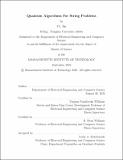Quantum Algorithms For String Problems
Author(s)
Jin, Ce
DownloadThesis PDF (851.8Kb)
Advisor
Williams, Virginia Vassilevska
Williams, R. Ryan
Terms of use
Metadata
Show full item recordAbstract
We design near-optimal quantum query algorithms for two important text processing problems: Longest Common Substring and Lexicographically Minimal String Rotation. Specifically, we show that:
- Longest Common Substring can be solved by a quantum algorithm in Õ(n²⸍³) time, improving upon the Õ(n⁵⸍⁶)-time algorithm by Le Gall and Seddighin (2022). Moreover, given a length threshold 1 ≤ d ≤ n, our algorithm decides in n²⸍³⁺⁰⁽¹⁾/d¹⸍⁶ time whether the longest common substring has length at least d, almost matching the Omega(n²⸍³/d¹⸍⁶) quantum query lower bound.
- Lexicographically Minimal String Rotation can be solved by a quantum algorithm in n¹⸍²⁺⁰⁽¹⁾ time, improving upon the Õ(n³⸍⁴)-time algorithm by Wang and Ying (2020), and almost matching the Ω(√n) quantum query lower bound.
Our algorithm for Lexicographically Minimal String Rotation is obtained by speeding up a divide-and-conquer algorithm using nested Grover search and quantum minimum finding. Combining this divide-and-conquer idea with the deterministic sampling algorithm of Vishkin (1991) and Ramesh and Vinay (2003), we achieve a quantum speed-up of the String Synchronizing Set technique introduced by Kempa and Kociumaka (2019). Our algorithm for Longest Common Substring applies this string synchronizing set in the quantum walk framework.
Date issued
2022-09Department
Massachusetts Institute of Technology. Department of Electrical Engineering and Computer SciencePublisher
Massachusetts Institute of Technology